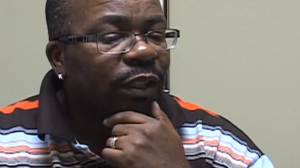
Louis Mitchell of the Castro District discusses tensions between communities of color and the gay male community in the late 80s and early 90s. (screencapture via “And Then It Happened to Them” YouTube video)
CHICAGO — It didn’t happen for me during the summer of ’69, but rather sometime around 2009 when I headed to San Francisco for an internship at the GLBT Historical Society in San Francisco. As an archives intern, I was holed up in the back of the fluorescently-lit floor-to-ceiling shelves that contained thousands of yellowing magazine pages, posters of the first gay pride marches, and perfectly preserved photographs in thick leather-bound albums. But what if the GLBT Historical Society had been started in 2008, lived online, and focused exclusively on the oral histories of transpeople?
The Trans Oral History Project is a grassroots community media initiative that collects the stories of trans, gender variant and gender non-conforming individuals. Open to all, it operates through a robust crew of individual volunteers, including Chicagoans André Pérez, Matthew Clark, and Alexis Martinez, and Philadelphia-based Helyx Chase and G Ragovin, and a steady stream of partnerships with organizations such as Allied Media Conference in Detroit, Ingersoll Gender Center in Seattle, and Soy Quien Soy in Chicago, among others. The project has been expanding since its inception in 2008, winning a Critical Fierceness Grant, launching a website for sharing video, audio, and written stories, collaborating with About Face Youth Theater, and doing workshops across the northeastern United States. I got in touch with André Pérez to learn more about what’s up next for the ambitious TOHP.
Read the full story on Hyperallergic: http://hyperallergic.com/97038/internet-archiving-trans-oral-histories/



